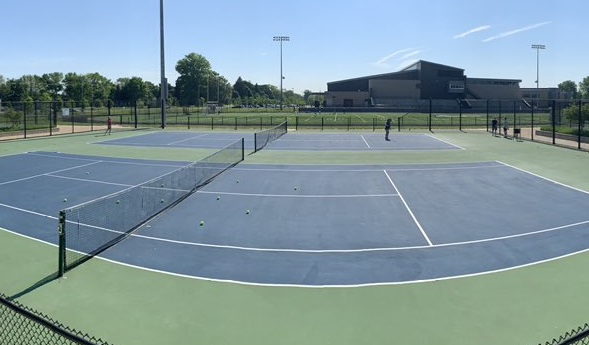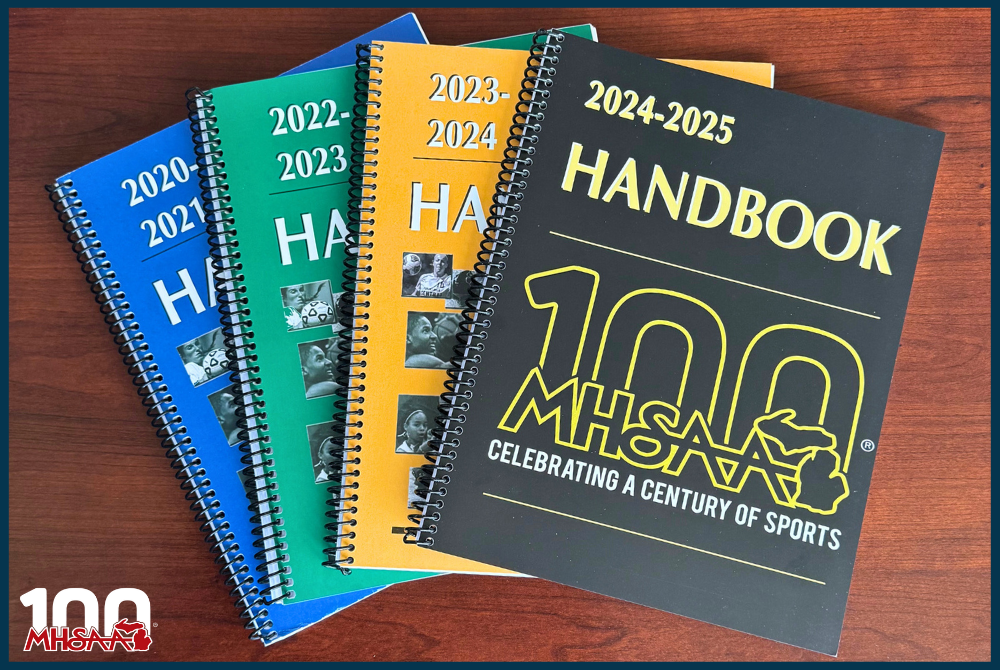
Let's Learn What This Time Can Teach Us
April 8, 2020
By Kevin Wolma
Hudsonville Athletic Director
A simple service return that landed into the net last fall ended my son’s tennis career.
When you are a senior, there is an end date. Just like that it is over.
Seems like yesterday I was playing catch with him in the front yard. Seems like yesterday I was rebounding as he shot at our basketball hoop. Seems like yesterday I put a tennis racquet in his hands for the first time. The success and failures along with the laughter and frustration all came to an end.
Along the way people would warn me about how fast the time goes, but when you are living day to day, you don’t really believe them. Going into the final day of the season, I had those thoughts that this would be the last day I’d watch my son play a competitive tennis match, but it didn't really hit me until I watched that last ball go into the net.
However, I also realized that we were going to experience many final moments during his senior year and this was a natural part of the journey. What I didn't know on that day was that this was the very last time I would see him compete. The cancellation of spring sports season with the COVID-19 crisis took that opportunity away from him competing in track & field this spring.
We never know when things will be taken away from us.
Administrators, Athletes, Coaches, Officials, Trainers:
Do you have a message that will provide inspiration, motivation or comfort to Michigan’s high school sports community during this unprecedented time? We’d like to help share it. Submit your “viewpoint” – written or video – to [email protected] for consideration for publication on Second Half.
My daughter, also a senior, will also lose the opportunity to finish her tennis career at Hudsonville because of the COVID-19 shutdown. For the two of us, tennis was more than a sport – it was our connection. From the time she was 5 years old hitting foam balls in the gym to now, the tennis court became far more than a surface with a net and lines.
The tennis court was our place of solitude. We hit thousands and thousands of tennis balls over the years. But more importantly, the tennis court created a platform where lessons were shared, stories of success and failure were told, and a love for a sport was born. I dread the day the tennis court sits silent, because that means my daughter will move on to her next stage in life. That time could be now.
Sports is not the end-all, and it surely does not define a person. However, it is a mechanism to bring people together and to teach life lessons that are often taken for granted, until we realize it is over.
The purpose of this article is not to talk about the end as much as it is to emphasize the importance of those moments leading to the end. Don’t let those moments slip away. If your son or daughter asks you to go outside and play catch, please put down the computer or phone and do it. The email can wait. The phone call can wait. The game on TV can wait.
Admittedly, I have been occasionally guilty of this as well and now realize the importance of time and how unpredictable it can be. I have one more chance with my youngest daughter to make sure we don’t take those moments for granted. They are moments we will never get back, and again, we never know when those moments will be taken away.
As a high school athletic director, all I’ve wanted was more time. Sixty plus-hour work weeks while trying to navigate work and home schedules is often a challenge. Many of us live this life every day. We all would like more time.
However, over a 48-hour span during the month of March 2020, time was all I had. In those two days, after the Utah Jazz’ Rudy Gobert tested positive for COVID-19, both the NCAA and NBA shut down while schools and businesses began closing their doors indefinitely.
Now, time is all any of us have.
My hope is that we realize time is a gift and we must be willing to receive it when available. Take advantage of the time to regain a perspective of what is really important in our lives and act on that. This moment in time will end and for many of us, our lives will resume juggling personal, work, and sports schedules. Are we ready? Did we take this “time off” from the busyness of life and focus on how we can maximize every moment of every day?
For some of us, this gives us a chance to hit the restart button and maybe look at youth sports through a different lens. Maybe our interactions with our kids, coaches, and officials will be more positive. Maybe we worry less about the outcome and more about the process. Once we get back to the playing field, maybe we will look at participation in sports differently. Maybe we will understand that it is truly a gift, and every gift deserves a level of gratitude – gratitude toward the many people who allow this experience, and all its life lessons, to transpire.
Years from now, when we look back at the year of COVID-19, will we still value the essence of time and living in the moment? Will we still give gratitude to the gift of sports? Each one of us wants to look back at our kid’s experiences with athletics and have no regrets. No regrets with our actions. No regrets with our time. We have an opportunity as parents right now to pause, reflect, and make changes that could impact youth sports for generations to come.
We must seize this opportunity now because this part of life will be over before we know it. For some of us, maybe even more quickly than we expected.
Wolma has served as Hudsonville's athletic director since 2011 and previously coached boys varsity basketball and girls varsity golf among other teams. He also previously taught physical education and health. Photo courtesy of the Hudsonville High School tennis programs.

Century of School Sports: Why Does the MHSAA Have These Rules?
By
Geoff Kimmerly
MHSAA.com senior editor
September 18, 2024
MHSAA administrators are two trips into their annual seven-stop fall tour that has become a tradition during nearly half of the Association’s “Century of School Sports” – and this year, a focus has been on answering a key question at the heart of educational athletics since long before the MHSAA was formed during the 1924-25 school year.
The MHSAA’s Update meeting series is in its 47th year and includes half-day conferences in seven locations – generally in the Kalamazoo, Metro Detroit, Grand Rapids, Saginaw, northern Lower Peninsula and mid-Michigan areas, and at Northern Michigan University in Marquette. The six Lower Peninsula sessions begin with an athletic director in-service during which MHSAA assistant directors explain recent rules changes and discuss challenges our administrators face on a daily basis (with Upper Peninsula athletic directors participating in a similar in-service during the spring).
Those in-services are followed by a session with executive director Mark Uyl, who speaks to athletic directors, superintendents, principals and school board members on a variety of topics including the MHSAA’s current objectives and ideas for the future, while also reinforcing the longstanding values that remain the bedrock of our daily work.
And that leads to the question he’s presenting across the state this fall:
Why does the MHSAA have these rules?
Frankly, the answer goes back to the beginning of school sports in Michigan – all the way back to 1895, when the first MHSAA predecessor organization was formed.
The first MHSAA Representative Council president Lewis L. Forsythe explained in his book “Athletics in Michigan High Schools – The First Hundred Years” how regulations always have been necessary:
“Eligibility rules are a necessity in interscholastic competition. It was common acknowledgement of this fact that led to the first State inter-school organization in 1895. The rules at first were few, simple and liberal. But with the passing of the years they came to be more numerous, more complex, and more restrictive, again through common acknowledgment of desirability if not of necessity.”
That necessity – and the reasoning behind it – has not changed.
Two main points explain why rules are absolutely imperative for educational athletics to thrive.
► 1. Participation – through providing as many opportunities as possible for students to play – has been the mission of school sports since their start. Rules contribute to the value of participation.
If there are requirements for children to participate in athletics – for example, an academic standard or rules that dissuade students from switching schools every year – then school sports programs mean more to all involved.
If we raise the bar, raise the standards of eligibility and conduct, we raise the value of our school sports programs. If we lower the bar, we lower the value of being part of school sports – because without rules, contest results are meaningless, and the value of participating is diminished.
► 2. We have rules where the stakes are higher, and agreement is lower – because where the stakes are highest, there is the greatest tendency for some people to try to gain an unfair advantage, and the greatest need for rules to curb possible dishonest activity.
This statement goes to the heart of the history, rationale and application of MHSAA rules. Obviously and simply put, school sports mean a lot to those who take part, and that significance is high enough to stoke disagreement – and we need rules to govern those disagreements. We have the most rules for high school sports, where championships are at stake and the possibility of disagreement is greatest.
***
Finally – and perhaps providing the strongest reinforcement of the two points above – is this:
Schools choose to make MHSAA rules their own.
Quite literally, school districts vote annually to be part of the MHSAA – and confirming this voluntary membership comes with the requirement to follow all MHSAA rules.
When schools challenge our rules, they literally are seeking to break the rules they already have committed to uphold.
These rules, and this commitment, are the strength of our organization across 752 member high schools and several hundred more middle schools and junior high schools. They have been constructed on a century of precedents and after considerations by representatives of those same member schools – representatives those schools have voted to elect every school year during the MHSAA’s history.
Previous "Century of School Sports" Spotlights
Sept. 10: Special Medals, Patches to Commemorate Special Year - Read
Sept. 4: Fall to Finish with 50th Football Championships - Read
Aug. 28: Let the Celebration Begin - Read

